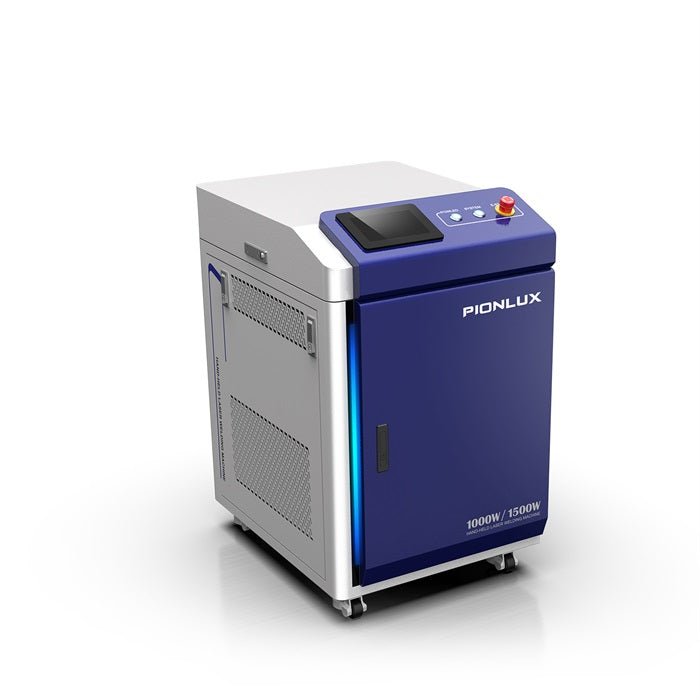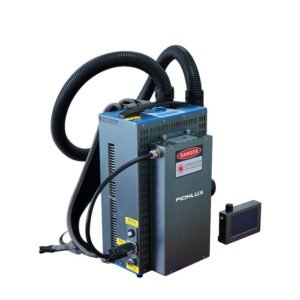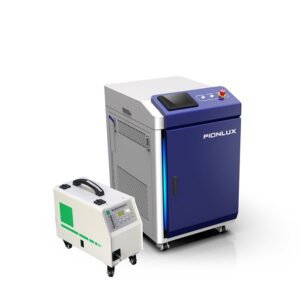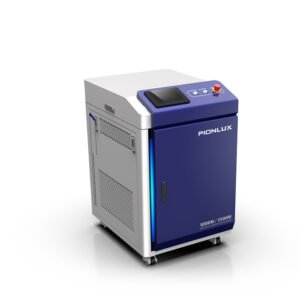Product Details:
|
Parameter
|
1000W water cooled
|
1500W water cooled
|
2000W water cooled
|
3000W water cooled
|
|
Maximum output power/W
|
1000
|
1500
|
2000
|
3000
|
|
Diameter
|
200 μm
|
300 μm
|
300 μm
|
400 μm
|
|
Fiber length/m
|
10
|
10
|
10
|
20
|
|
Total power/W
|
6000
|
6500
|
7500
|
9500
|
|
Laser Beam Quality, BPP
|
20~22 mm*mrad
(200μm)
|
25~28 mm*mrad
(300μm)
|
25~28 mm*mrad
(300μm)
|
30~33 mm*mrad
(400μm)
|
|
Mode of Operation
|
CW/Modulated
|
|||
|
Preview red light power
|
150 μW
|
|||
|
Power adjustment range/%
|
10-100
|
|||
|
Cooling method
|
water cooled
|
|||
|
Bending Radius
|
200 mm
|
|||
What is a Continuous Laser Cleaning Machine?
A continuous laser cleaning machine is an advanced technological solution designed for the effective removal of contaminants from various surfaces using laser technology. These machines utilize concentrated beams of light to clean surfaces by emitting high-intensity laser energy, which agglomerates and evaporates the unwanted materials, such as rust, paint, or other stubborn residues. This innovative approach represents a significant advancement in industrial cleaning techniques compared to traditional methods like chemical cleaning or abrasive blasting.
The design of continuous laser cleaning machines is often modular, featuring a laser source, control systems, and a movement mechanism that can steer the laser beam across the surface being cleaned. Typically, the grating or focusing lens optimizes the laser energy intensity to maximize cleaning efficiency. Various types of lasers are used in these machines, including fiber lasers, CO2 lasers, and solid-state lasers. Each laser type has distinct advantages based on the specific cleaning application, such as the nature of the material being cleaned and the depth of contamination.
This cleaning technology can successfully address a wide range of materials, including metals, plastics, and ceramics. The versatility of continuous laser cleaning machines makes them suitable for diverse industries, from automotive to aerospace to historical restoration. As industries evolve, the demand for effective, eco-friendly cleaning solutions grows, placing laser cleaning at the forefront of modern industrial practices. The rise of continuous laser cleaning machines aligns with an overarching trend towards automation and precision in the maintenance of equipment and facilities, marking a pivotal moment in the history of industrial cleaning technology.
Benefits and Applications of Continuous Laser Cleaning Machines
Continuous laser cleaning machines offer a range of advantages over traditional cleaning methods, including chemical and abrasive techniques. One of the primary benefits of laser cleaning is its incredible efficiency. Laser systems can effectively remove contaminants such as rust, paint, and dirt from surfaces without extensive downtime, which minimizes production interruptions in various industries.
Precision is another significant advantage of laser cleaning technology. The focused nature of the laser allows for selective cleaning, targeting specific areas without affecting adjacent surfaces. This precision is particularly valuable in delicate applications, such as art restoration, where maintaining the integrity of the original material is paramount. Traditional abrasive methods may inadvertently damage or alter the surface, while laser cleaning preserves the object’s original condition.
Moreover, the safety of continuous laser cleaning machines enhances their appeal. Unlike traditional cleaning techniques, which often require hazardous chemicals or abrasive materials, laser cleaning utilizes light energy, significantly reducing the risk of exposure to harmful substances. This safety improvement not only protects workers but also reduces the environmental impact associated with chemical disposal and the use of abrasive materials.
Environmental benefits arise from the minimal waste generated during the laser cleaning process. Continuous laser cleaning machines produce less effluent compared to conventional cleaning methods, which can create a toxic byproduct that must be disposed of carefully. This eco-friendliness aligns with the increasing global emphasis on sustainability, making laser cleaning a more responsible choice for organizations looking to minimize their ecological footprint.
In terms of applications, continuous laser cleaning is transforming various sectors. For instance, in manufacturing and automotive industries, laser cleaning helps in preparing surfaces for painting or welding, ensuring optimal adhesion and quality. In aerospace, it assists in maintaining the integrity of components critical for safety. Additionally, the art restoration field benefits by allowing conservators to clean valuable artifacts gently without risk of damage. The versatility and effectiveness of continuous laser cleaning machines are paving the way for widespread adoption across multiple sectors.






Értékelések
Még nincsenek értékelések.